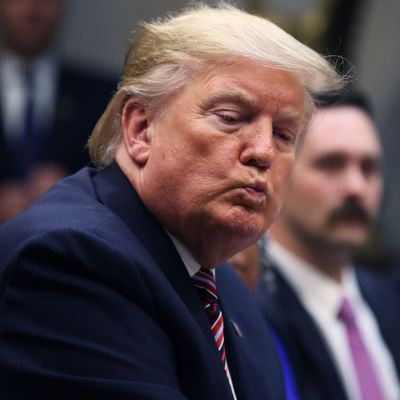
Teenage climate activist Greta Thunberg was named Time’s Person of the Year on Thursday. The title’s primary perk is glossy photograph of yourself on the cover of Time magazine, which is almost certainly why it’s so important to President Trump. He greeted the news by raging on Twitter against the child’s success. “So ridiculous,” he tweeted. “Greta must work on her Anger Management problem, then go to a good old fashioned movie with a friend! Chill Greta, Chill!”
This is a theme for the president: When Thunberg’s made headlines before, he has responded similarly by ridiculing her dour affect. (She has Aspberger syndrome and is understandably worried about the world becoming uninhabitable due to human-caused warming.) It also fits neatly with his fixation on the Person of the Year designation, which he earned in 2016 but claims, despite Time’s denial, to have spurned the following year upon learning he’d only “probably” get it instead of definitely. “The mainstream media has never wanted to give this president the credit that he’s deserved,” Trump’s former campaign manager Corey Lewandowski told Fox News in 2017, declining to note that Trump had just been awarded the very title that was the basis for his complaint.
Plenty have observed the tension between Trump’s broadsides against Thunberg and the outrage his supporters express whenever others speak ill of — or even mention in passing — the children of conservative political figures. Melania Trump tweeted indignantly that children were off limits earlier this month after Pamela Karlan, a Stanford law professor who, while testifying at an impeachment hearing, noted that “the president can name his son Barron” but “can’t make him a baron.” The First Lady responded: “A minor child deserves privacy and should be kept out of politics. Pamela Karlan, you should be ashamed of your very angry and obviously biased public pandering, and using a child to do it.” Melania herself has sought to balance out her husband’s dismal record on child welfare — including his imprisonment en masse of migrant children from Central America — by pursuing initiatives to end cyberbullying and youth opioid addiction. But few have been fooled. The First Lady was greeted in Baltimore last month with raucous boos from a crowd of middle-school-aged children during a promotional appearance. Meanwhile, right-wing ad hominems against children remain crucial to the movement’s playbook, as the cases of Thunberg, David Hogg, and — to a more severe degree — Trayvon Martin illustrate.
Far from aberrant, Trump’s impulse to diminish young girls in particular by characterizing their accomplishments as worthwhile primarily in terms of whether their outward appearance pleases him is part of a pattern. His misogyny is well documented: From his leering behavior at Miss America events to the myriad accusations of sexual assault he faces, not to mention his proud declaration that he grabs women by the genitals unprompted, loom as large over his presidency as they did his 2016 campaign. And despite his repeated denials of physical misconduct, Trump’s rhetoric indicates an almost uniformly reductive view of women that privileges how they look above all else. His criticism of Thunberg’s seriousness is scarcely different from men on the street imploring women passersby to smile for them. This outlook is no more apparent than in how he’s spoken about his own daughters. In a 2006 interview on The View, he said he would “perhaps” date Ivanka Trump were she not related to him. In a 1994 interview with Robin Leach, he was asked which traits then 1-year-old Tiffany Trump inherited from her parents, himself and Marla Maples.
His response, via HuffPost:
“Well, I think she’s got a lot of Marla, she’s a really beautiful baby,” said Trump, who sat next to Maples. “She’s got Marla’s legs. We don’t know whether or not she’s got this part yet, but time will tell,” Trump added, while cupping his hands to his chest to indicate breasts.
On the subject of girls and what makes them notable, Trump has been fairly consistent throughout his adult life. A man who proudly anticipates his infant daughter’s breast size while sitting next to her mother on national TV should surprise no one by criticizing a 16-year-old Time magazine cover star on the basis that she looks too glum. Perhaps less predictable is that casting pejoratives against children would become such a reliable line of attack for conservatives who lack substantive responses to the issues on whose behalf those children advocate. There is no rigorous right-wing retort to the consensus among climate scientists that humans are causing drastic — and possibly irreversible — changes to the planet’s atmosphere and biodiversity. But there’s an undeniable appetite for mocking Greta Thunberg, as evidenced by Trump’s tweets and Fox News guests and hosts calling her a “mentally-ill Swedish child” or comparing her to the deranged young villains of The Children of the Corn. Yet it has indeed become a go-to strategy. And Thunberg, to her credit, has greeted it with humor. The rest of America should not be as good-natured. The stakes are higher every day.






























